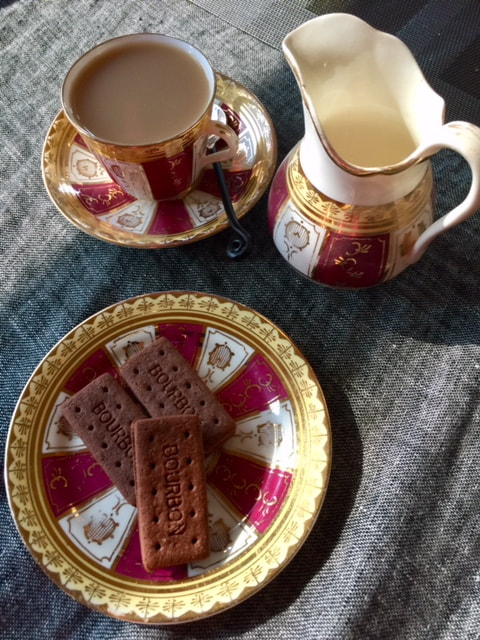
I got such a nice note from a fan a the other day who was holding a book club event in which Death In The Darkening Mist was the chosen book. That was lovely on its own, but her description of the tea, complete with cucumber sandwiches, put me in mind of the teas of my childhood in the community upon which I model King’s Cove.
Tea was as necessary to life as the water in the creeks. It was breakfast, mid afternoon and often, for those who seemed unaffected by caffeine, the drink before bed. Most days tea was accompanied by some packaged biscuits, which we more commonly think of as cookies. The two that were ubiquitous that come to mind are both English; digestives and bourbon crèmes. Children were often given arrowroot cookies, which I loved, because when you dunked them in tea they became, I now see in retrospect, an unpleasant fat, soggy, paste sort of texture. If you weren’t careful the whole dunked end would cascade into your cup, where you would try to fish it out with a spoon. It was always too late, of course, and the cookie disintegrated, leaving a mess of cookie sog in the bottom of your cup. For some reason I have never understood, arrowroot was good for children. Based, perhaps, on some Victorian consistency scale; soft and pasty, children, grainy and full of roughage, grown ups. My favourite of course, were the bourbon crèmes, though I felt they too were for the grown ups, because they were fancy and tasted good.
And in the summer the glorious high teas. Teas at church fetes, or summer teas on Sundays served outside. These were the teas where the cakes came out, and the egg salad sandwiches, and on a very special day, devilled egg. There was a cake I loved, with nuts and spices and billows of icing, which I have learned is very traditional at English teas; walnut cake. And a sort of pound cake with cherries, and always something with chocolate. Brownies, maybe some sort of single layer cake that predated the sheet cake. There was a kind of fruitcake, ubiquitous in the homes of my elderly British relatives, but rarer in my childhood community. These appeared around Christmas, having been sent from ‘the old country’, and were kept in round tins and worked on till they were finally gone, some time in February. I and my childhood friends avoided these sinister, dark, slightly burnt-tasting objects. Now of course, I love a good fruitcake.
The church fetes were fantastic. I have been to many a church tea over the years since my childhood, and they have never measured up to the first ones. They were in high summer, always outside under spreading trees on tables set with a myriad of styles of table cloth. Tea wasn’t served from an urn. Milk wasn’t in a carton. Sugar wasn’t in packets. Somewhere offstage water was being boiled constantly, and the china tea pots were full all day long with hot tea. We poured milk out of a little jug into our cups, and added sugar, and a grown up, tsk tsking by the third spoon of sugar, would fill the cup with tea and send us off to sit on a rug on the grass, with urgent warnings not to spill it.
Cakes of every kind lined the tables. Of course, there were sandwiches, and we ate them if any adults were watching. Soft white bread spread with butter or margarine, still very popular after the war, with egg, or cucumber, or canned ham. It was the cake, though, that was of paramount attraction, and for these parish teas bakers put their best foot forward with cakes with three layers, and jam fillings, and icing that looked like a whirling storm at sea. If you were lucky, some of the cakes were not part of the bake sale, and were cut up to serve with the tea. I only ever rebelled at one cake; coconut. To this day I do not care to encounter shreds of coconut, tasteless and like little strips of cardboard, in any cake.
In a world where nearly everything a child was likely to want would ‘stunt your growth’, I am ever thankful that endless cups of tea with unregulated amounts of sugar and milk, never made the list.